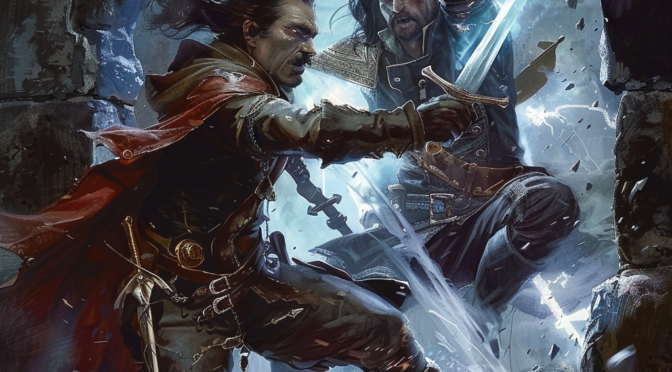Characters are described as having abilities; the specific abilities a character possesses are determined by the character’s narrative background. Abilities are ranked by a die code and further described by one or more skills and specializations which enhance the die code. Abilities are either normal or extranormal. Abilities describe broadly defined actions which they allow the character to perform. Rolling the dice to test an ability or skill against a difficulty is called an ability check (when not testing a specific skill, or when using a default value) or a skill check (when testing a skill or specialization). The term “ability check” is a blanket term for rolling the dice to test against a difficulty number and applies to both abilities and skills.
All characters are described as either Dynamic or Stock in relation to their importance in the narrative, both of these are unranked normal abilities (no die code). All player characters are automatically Dynamic; opponents that are central to the adventure are also Dynamic. Opponents and NPCs that are relatively unimportant to the adventure are Stock. Some abilities require a character to be Dynamic in order to acquire the ability. Some conditions only apply to Stock characters.
Normal abilities are possessed by most characters and elements, and do not have a narrative background requirement. Characters possess the normal abilities of Strength, Dexterity, Presence, Wits, Intelligence, and Perception. Vehicles and equipment possess the normal abilities of Body, Energy, Handling, or Speed.
Extranormal abilities are not possessed by most characters and elements, and usually have a narrative background requirement. Some common narrative backgrounds and their associated extranormal abilities are: wizard (magic), mutant (super powers), adept (metaphysics), and cyborg (cybernetics).
Skills describe specific uses or actions within the broadly defined actions of an associated ability. A skill’s die code is added to the die code of the associated ability when making a skill check. If a character must make a skill check for a skill in which they have no ranks, they make an ability check instead.
Specializations describe specific uses or actions within the narrowly defined actions of an associated skill. A specialization’s die code is added to the die code of the skill and ability when making a skill check. If a character does not have ranks in a specialization, they use only their ranks in the associated skill. If they do not have ranks in the skill, they make an ability check instead.
A character may have ranks in a specialization without having ranks in the associated skill. If a character does not have a specialization, the associated skill score is used instead. If a character does not have a skill, the associated ability score is used instead. If a character does not have an ability, they cannot make associated ability checks. Sometimes the Game Master will call for a skill or specialization to be used with an ability other than the one it is normally associated with.
Some skills and specializations require training before they can be used. If a character needs to make a skill check with a skill that requires training, they must have ranks in that skill or specialization. Characters may not use only their associated ability score to make a skill check that requires training.
Rolling Dice
Die codes describe the number of six-sided dice and adds (pips) rolled when an ability or skill check is made. A die code is written as “number of dice” followed by “D”. If the die code has adds (referred to as “pips”), they follow the “D” and are written as “+1” or “+2”. To make an ability or skill check, roll the die code and add the pips to generate a skill total. For example, a die code of 3D+2 would roll three six-sided dice, add them together, and add 2 to get the final skill total. The skill total is compared to a difficulty; the difference between the two numbers – positive or negative – is the result points. Result points are used to describe the success, failure, or degree of effect of the action.
Adding die codes together is done by adding together the dice and pips of the ability, skill, and specialization of the skill check and applying the die code progression to get the final value. Every three pips increases the die code by 1D instead. For example, a skill check of Dexterity 3D+2 and Shooting 1D+2 yields a skill value of 4D+4; +3 pips instead increases the die code by 1D for a final skill value of 5D+1.
